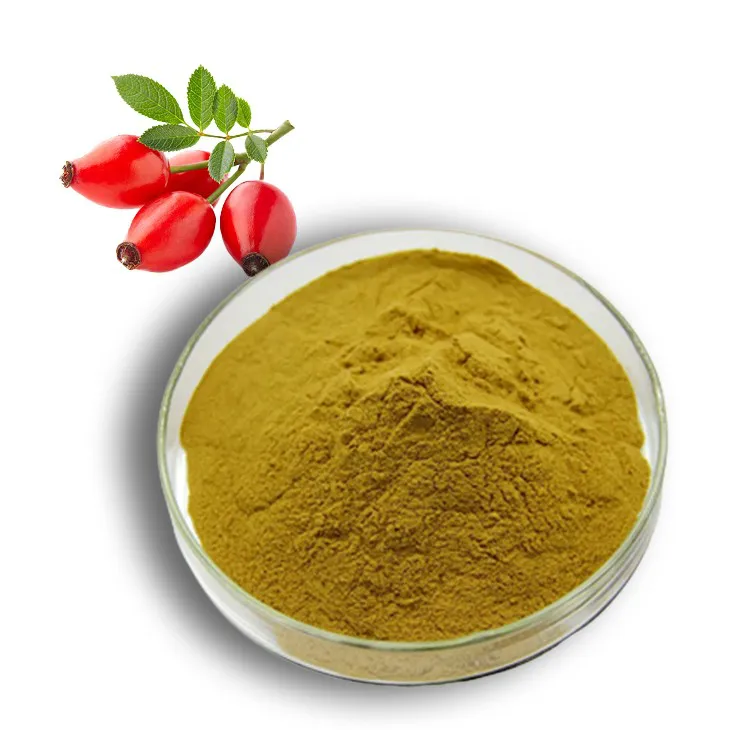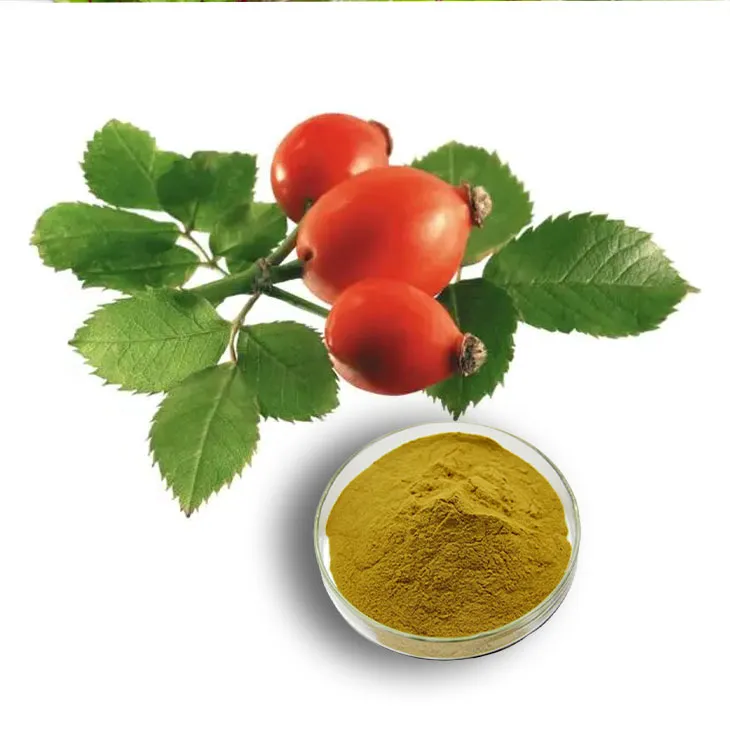- 0086-571-85302990
- sales@greenskybio.com
5 Big Reasons for Using Rose Hip Extract in the Food Industry.
2024-12-15

1. Rich in Vitamins, Especially Vitamin C
Rosehip extract has become a significant addition to the food industry, and one of the primary reasons is its high vitamin content, especially vitamin C. Vitamin C is an essential nutrient that plays a crucial role in human health. In the context of food products, the presence of vitamin C in rosehip extract can enhance the nutritional value of the final product significantly.
Many food products today are fortified with vitamins to meet the nutritional needs of consumers. Rosehip extract offers a natural source of vitamin C, which is more appealing to consumers who prefer natural ingredients over synthetic ones. For example, in the production of fruit juices, adding rosehip extract can increase the vitamin C content without relying on artificial vitamin C supplements. This not only improves the nutritional profile of the juice but also gives it a more natural and healthy image.
In addition to juices, products like breakfast cereals, energy bars, and even some dairy products can benefit from the addition of rosehip extract. Vitamin C is also known for its role in collagen synthesis, which is important for skin health. By incorporating rosehip extract into food products, manufacturers can potentially market their products as beneficial for skin health as well.

2. Antioxidant Properties
Another major reason for using rosehip extract in the food industry is its antioxidant properties. Antioxidants play a vital role in the food industry as they help in protecting food from spoilage and prolonging shelf - life. Oxidation is a natural process that can lead to the degradation of food quality, causing changes in flavor, color, and nutritional value.
Rosehip extract contains various antioxidants such as phenolic compounds and carotenoids. These antioxidants work by scavenging free radicals, which are highly reactive molecules that can cause oxidative damage to food components. In the case of fats, for example, oxidation can lead to rancidity. By adding rosehip extract to food products that contain fats, such as baked goods or processed meats, manufacturers can prevent or delay the onset of rancidity.
In the preservation of fruits and vegetables, either in fresh - cut or processed forms, rosehip extract can also be useful. It can help maintain the color and freshness of these products for a longer period. This is especially important in the food supply chain, where products need to be stored and transported over long distances. By using rosehip extract as a natural antioxidant, the need for synthetic preservatives can be reduced, which is appealing to consumers who are increasingly conscious about the additives in their food.

3. Unique Flavor
The unique flavor of rosehip extract is yet another reason for its growing use in the food industry. It can add a special and pleasant taste to a wide variety of foods. Rosehip has a distinct, somewhat tart and fruity flavor that can enhance the overall taste profile of a product.
In the confectionery industry, for instance, rosehip extract can be used in the production of candies, gummies, and jellies. Its tart flavor can balance the sweetness of these products, creating a more complex and enjoyable taste. In the production of jams and preserves, rosehip extract can add a new dimension to the traditional fruit flavors. It can be combined with other fruits like strawberries or raspberries to create unique and delicious blends.
Beverages also benefit from the flavor of rosehip extract. It can be added to herbal teas, fruit punches, and even some alcoholic beverages. In herbal teas, it can add a fruity note that complements the other herbal flavors. In fruit punches, it can enhance the overall fruitiness and give the drink a more refreshing taste. In alcoholic beverages, such as wines or liqueurs, rosehip extract can contribute to a more nuanced and sophisticated flavor profile.

4. Potential Health - Promoting Functions
Rosehip extract has potential health - promoting functions for consumers, which is a significant factor in its use in the food industry. One of the most well - known benefits is its role in improving immunity. The high vitamin C content, along with other bioactive compounds in rosehip extract, can support the immune system.
In addition to immunity, there is evidence to suggest that rosehip extract may have anti - inflammatory properties. Chronic inflammation is associated with many health problems, including heart disease, diabetes, and arthritis. By including rosehip extract in food products, manufacturers can potentially offer products that may help in reducing inflammation in consumers.
Some studies also indicate that rosehip extract may have benefits for digestive health. It could potentially aid in digestion and improve gut health. In the context of functional foods, which are designed to provide health benefits beyond basic nutrition, rosehip extract can be a valuable ingredient. For example, in the production of probiotic - rich yogurts or other dairy products, adding rosehip extract could enhance the overall health - promoting properties of the product.
5. Natural Ingredient
The fact that rosehip extract is a natural ingredient is a major selling point in the food industry today. There is a growing demand for natural and clean - label foods among consumers. People are becoming more aware of the ingredients in their food and are increasingly looking for products that are free from artificial additives, colors, and preservatives.
Rosehip extract fits perfectly into this trend. It is derived from the fruit of the rose plant, which is a natural source. Using rosehip extract in food products allows manufacturers to label their products as "natural" or "made with natural ingredients." This can attract consumers who are willing to pay a premium for products that they perceive as healthier and more natural.
Moreover, as consumers become more environmentally conscious, the natural origin of rosehip extract can also be appealing. Rose plants are often grown without the need for excessive pesticides or fertilizers, especially in wild - harvested cases. This aligns with the growing trend of sustainable and environmentally - friendly food production.
FAQ:
Q1: What vitamins are mainly contained in rosehip extract?
Rosehip extract is mainly rich in vitamin C among other vitamins. Vitamin C is a key component that enhances the nutritional value of food products.
Q2: How does the antioxidant property of rosehip extract work in the food industry?
The antioxidant property of rosehip extract helps in protecting food from spoilage. It does this by preventing oxidative reactions that can lead to the degradation of food components, thereby prolonging the shelf - life of food products.
Q3: What kind of special flavor does rosehip extract bring to foods?
The unique flavor of rosehip extract adds a special and pleasant taste to various foods. However, the exact flavor profile can be described as a slightly tart, fruity, and somewhat floral note, which can enhance the overall taste complexity of food items.
Q4: How does rosehip extract improve consumers' immunity?
Rosehip extract contains certain bioactive compounds that may interact with the body's immune system. While the exact mechanisms are still being studied, it is believed that these compounds can stimulate immune responses, helping to improve the body's natural defenses.
Q5: Why is the natural aspect of rosehip extract important in the food industry?
In the current market, there is a growing demand for natural and clean - label foods. Rosehip extract, being a natural ingredient, meets this demand. It provides a more natural alternative to synthetic additives, appealing to consumers who prefer minimally processed and more natural food products.
Related literature
- The Nutritional and Functional Properties of Rosehip Extract in Food"
- "Rosehip Extract: A Natural Ingredient for Food Preservation and Enhancement"
- "Beneficial Effects of Rosehip Extract on Health and Its Applications in the Food Sector"
- ▶ Hesperidin
- ▶ Citrus Bioflavonoids
- ▶ Plant Extract
- ▶ lycopene
- ▶ Diosmin
- ▶ Grape seed extract
- ▶ Sea buckthorn Juice Powder
- ▶ Fruit Juice Powder
- ▶ Hops Extract
- ▶ Artichoke Extract
- ▶ Mushroom extract
- ▶ Astaxanthin
- ▶ Green Tea Extract
- ▶ Curcumin
- ▶ Horse Chestnut Extract
- ▶ Other Product
- ▶ Boswellia Serrata Extract
- ▶ Resveratrol
- ▶ Marigold Extract
- ▶ Grape Leaf Extract
- ▶ New Product
- ▶ Aminolevulinic acid
- ▶ Cranberry Extract
- ▶ Red Yeast Rice
- ▶ Red Wine Extract
-
Moringa powder
2024-12-15
-
Aminolevulinic acid
2024-12-15
-
Echinacea Extract
2024-12-15
-
Dandelion Leaf Extract
2024-12-15
-
Scutellaria Extract
2024-12-15
-
Cassia Seed Extract
2024-12-15
-
Yellow Pine Extract
2024-12-15
-
Camu Camu Extract
2024-12-15
-
Tamarind extract powder
2024-12-15
-
Hesperidin
2024-12-15





















